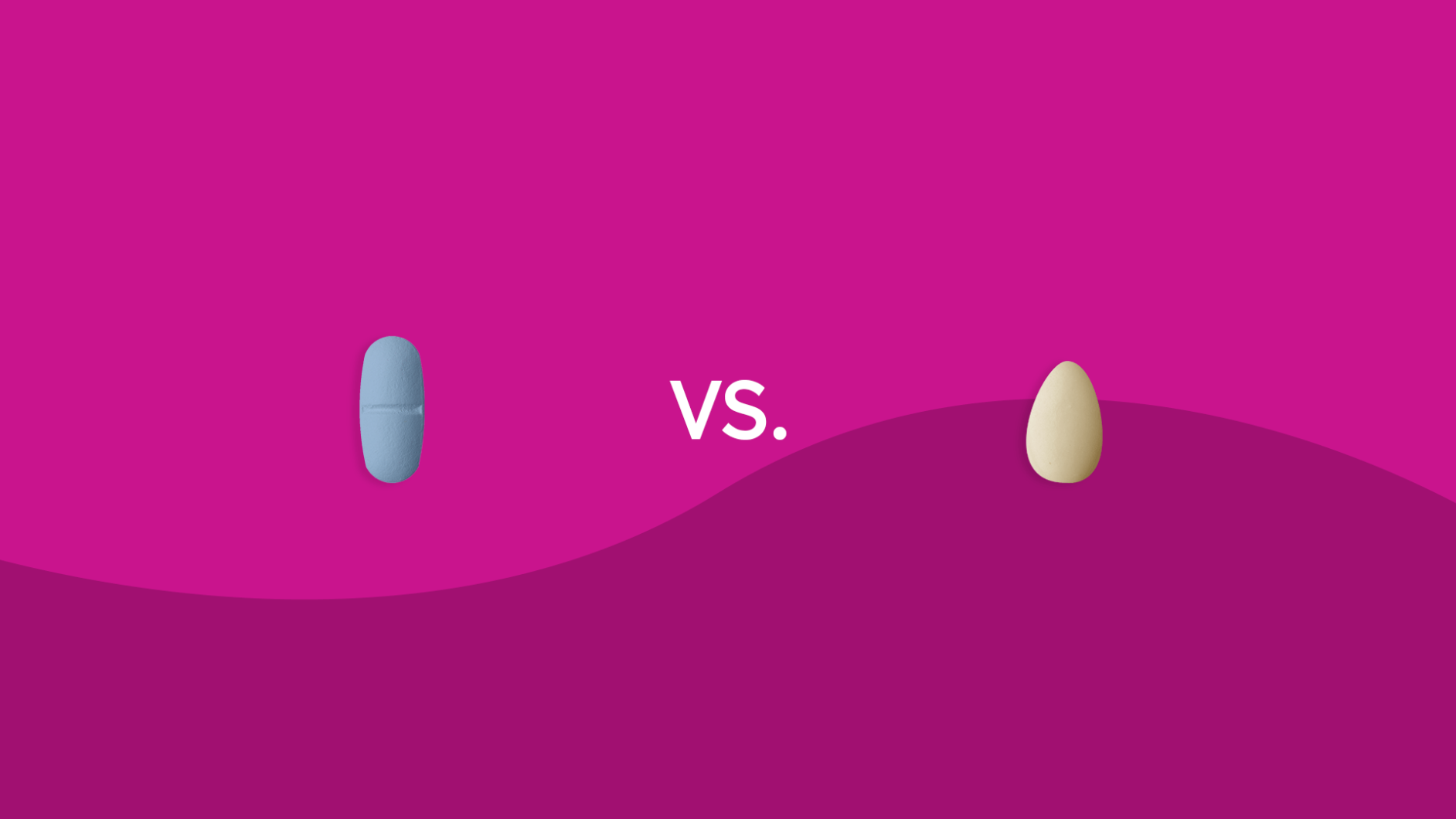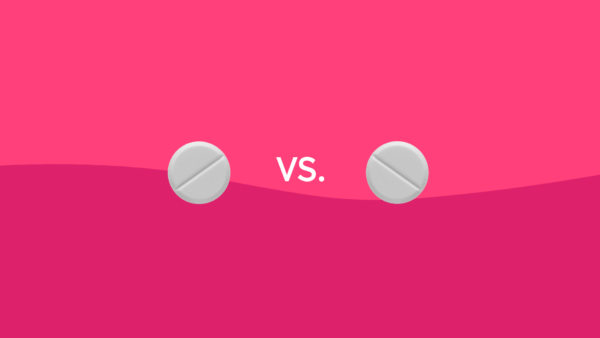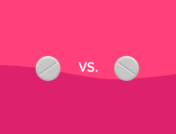Drug overview & main differences | Conditions treated | Efficacy | Insurance coverage and cost comparison | Side effects | Drug interactions | Warnings | FAQ
Trintellix and Zoloft are two treatment options for one of the most common mental disorders in America, major depressive disorder. Major depressive disorder (MDD) is characterized by a period of at least two weeks where a patient experiences a depressed mood or loss of interest in activities that typically bring joy. MDD can cause significant impairment to mental health. It can also cause issues with sleeping, eating, concentrating, and energy.
Trintellix (vortioxetine) is considered a serotonin modulator and stimulator and is pharmacologically unique as compared to other antidepressants. Zoloft (sertraline) is a selective serotonin reuptake inhibitor (SSRI) and belongs to the same class of antidepressants as drugs such as Prozac (fluoxetine), Paxil (paroxetine), Celexa (citalopram), and Lexapro (escitalopram).
What are the main differences between Trintellix vs. Zoloft?
Trintellix is a prescription medication indicated in the treatment of major depressive disorder. It is classified as a serotonin modulator and stimulator, making it distinct from other antidepressants currently available. While the exact mechanism of action is difficult to isolate, it is thought to increase serotonin activity through inhibition of the serotonin transporter in the neuron synapse. It has been shown to block multiple serotonin receptors, while also stimulating at least one serotonin receptor, 5-HT1A. Higher levels of available serotonin are associated with improved mood and energy levels.
Trintellix was originally brought to market under the trade name Brintellix, but concerns over potential errors due to the similarities in name to the blood thinner Brilanta led the FDA to change its name in June of 2016. Trintellix is available as an oral tablet in strengths of 5 mg, 10 mg, and 20 mg.
Zoloft, and its generic form sertraline, is also a prescription medication indicated in the treatment of depression. Zoloft is classified as a selective serotonin reuptake inhibitor and works by blocking the reuptake of serotonin at the neuronal synapse.
Zoloft is available as an oral tablet in strengths of 25 mg, 50 mg, and 100 mg. It is also available in an oral concentrated solution that is 20 mg/ml.
| Main differences between Trintellix vs. Zoloft | ||
|---|---|---|
| Trintellix | Zoloft | |
| Drug class | Serotonin modulator and stimulator | Selective serotonin reuptake inhibitor |
| Brand/generic status | Brand only available | Brand and generic available |
| What is the generic name? |
Vortioxetine | Sertraline |
| What form(s) does the drug come in? | Oral tablet | Oral tablet, concentrated oral solution |
| What is the standard dosage? | 20 mg daily | 50 mg daily |
| How long is the typical treatment? | Months to years | Months to years |
| Who typically uses the medication? | Adults | Children and adolescents |
Conditions treated by Trintellix vs. Zoloft
Trintellix only carries one approved indication, major depressive disorder. Zoloft is also indicated in the treatment of major depressive disorder, but has several other uses as well.
Zoloft is approved in the treatment of obsessive-compulsive disorder as well as social anxiety disorder. It is also approved to treat symptoms of panic disorder and post-traumatic stress disorder (PTSD). Zoloft has many “off-label” uses, or uses that have not been officially approved by the Food and Drug Administration (FDA). These off-label uses include generalized anxiety disorder (GAD), separation anxiety disorder, hot flashes associated with menopause, and premature ejaculation.
The following table lists some of the known uses of Trintellix and Zoloft. Only your doctor can decide which medication may be right for your condition.
| Condition | Trintellix | Zoloft |
| Major depressive disorder | Yes | Yes |
| Obsessive compulsive disorder (OCD) | No | Yes |
| Social anxiety disorder | No | Yes |
| Generalized anxiety disorder | No | Off-label |
| Separation anxiety disorder | No | Off-label |
| Panic disorder | No | Yes |
| Post-traumatic stress disorder | No | Yes |
| Hot flashes associated with menopause | No | Off-label |
| Premature ejaculation | No | Off-label |
| Premenstrual dysphoric disorder (PMDD) | No | Yes |
Is Trintellix or Zoloft more effective?
Researchers have sought to compare the efficacy and tolerability of antidepressants extensively. Discontinuation rates for antidepressant drugs of various types can be a cause for concern when healthcare providers are choosing therapies for their patients.
A meta-analysis compared multiple antidepressants in both efficacy and tolerability. The active ingredients for both Trintellix and Zoloft were included. Researchers found that all antidepressants were more effective than placebo. Trintellix was included in a list of antidepressants more effective than others, while Zoloft was not. However, both drugs were found to be some of the more tolerable antidepressants, leading to lower discontinuation rates.
A separate literature review looked at Trintellix as second therapy for those who fail to have an adequate response to SSRIs like Zoloft. This review evaluated patients who had an inadequate response to single therapy with an SSRI and were switched to another treatment option. Those switched to Trintellix saw higher remission rates as compared to other therapies.
Trintellix appears to be at least comparable, if not superior to, SSRIs like Zoloft. The tolerability of both drugs is relatively favorable when compared to other antidepressants as a whole. Only your healthcare provider can decide which therapy is right for you.
Coverage and cost comparison of Trintellix vs. Zoloft
Trintellix is a prescription medication that is typically covered by both Medicare and commercial insurance plans. The out-of-pocket price for a single month of Trintellix 20 mg can be as high as $660. With a coupon from SingleCare, you could pay less than $400.
Zoloft is also a prescription medication that is generally covered by both Medicare and commercial drug plans. The out-of-pocket price of brand-name Zoloft may be as high as $105, but with a coupon from SingleCare, you could pay as little as $10 for the generic.
| Trintellix | Zoloft | |
| Typically covered by insurance? | Yes | Yes |
| Typically covered by Medicare Part D? | Yes | Yes |
| Standard dosage | 30, 20 mg tablets | 30, 50 mg tablets |
| Typical Medicare copay | Variable based on plan | $10 or less |
| SingleCare cost | $357 | $10 |
Common side effects of Trintellix vs. Zoloft
Trintellix and Zoloft each affect serotonin pathways, and therefore their potential side effects are similar but may occur at different frequencies. Each of these drugs are likely to cause gastrointestinal side effects such as nausea, vomiting, diarrhea, and/or constipation. Nausea occurs in as many as 1 in 3 patients taking Trintellix, and 1 in 4 patients taking Zoloft.
Zoloft is reported to cause somnolence in 11% of patients taking it, while Trintellix literature does not report somnolence as a potential side effect.
Sexual dysfunction appears to happen at a much higher rate with Trintellix as compared to Zoloft, 30-35% versus 6% respectively. Sexual side effects are important to consider as they may lead patients to discontinue the drug. Neither drug reports significant weight loss or weight gain.
The following list is not intended to be a complete list of adverse events. Please consult a pharmacist, doctor, or another medical professional for a complete list of possible side effects.
| Trintellix | Zoloft | |||
| Side effect | Applicable? | Frequency | Applicable? | Frequency |
| Nausea | Yes | 32% | Yes | 26% |
| Dry mouth | Yes | 8% | Yes | 14% |
| Sweating | No | n/a | Yes | 7% |
| Diarrhea | Yes | 7% | Yes | 20% |
| Constipation | Yes | 6% | Yes | 6% |
| Dyspepsia | No | n/a | Yes | 8% |
| Vomiting | Yes | 6% | Yes | 4% |
| Dizziness | Yes | 9% | Yes | 12% |
| Somnolence | No | n/a | Yes | 11% |
| Abnormal dreams | Yes | 3% | No | n/a |
| Pruritus | Yes | 3% | No | n/a |
| Decreased appetite | No | n/a | Yes | 3% |
| Flatulence | Yes | 1% | No | n/a |
| Decreased libido | Yes | 30-35% | Yes | 6% |
Source: Trintellix (DailyMed) Zoloft (DailyMed)
Drug interactions of Trintellix vs. Zoloft
The concurrent use of either Trintellix or Zoloft with monoamine oxidase inhibitors can lead to an increased incidence of serotonin syndrome. Serotonin syndrome is characterized by feeling agitated, dizzy, or having an increased heart rate or blood pressure. This occurs when there is an abnormally high level of serotonin in the body. Other drugs that may lead to serotonin syndrome when used with Trintellix or Zoloft include fentanyl, lithium, tramadol, buspirone, and St. John’s Wort.
Zoloft may interact with certain classes of medication and cause a specific type of cardiac arrhythmia known as a prolonged QTc interval. This can occur with commonly used antibiotics such as erythromycin or gatifloxacin. It may also occur with antipsychotics such as ziprasidone or chlorpromazine. It is important that your prescriber is aware of your complete list of medications before prescribing you new ones.
The following list is not intended to be a complete list of drug interactions. It is best to consult your provider or pharmacist for a complete list.
| Drug | Drug class | Trintellix | Zoloft |
| Selegiline Phenelzine Linezolid Isocarboxazid |
Monoamine oxidase inhibitors (MAOIs) | Yes | Yes |
| Citalopram Escitalopram Fluoxetine Paroxetine |
Selective serotonin reuptake inhibitors (SSRIs) | Yes | Yes |
| Desvenlafaxine Venlafaxine Duloxetine Levomilnacipran |
Selective norepinephrine reuptake inhibitors (SNRIs) | Yes | Yes |
| Amitriptyline Desipramine Doxepin Imipramine Nortriptyline |
Tricyclic antidepressants | Yes | Yes |
| Almotriptan Eletriptan Frovatriptan Naratriptan Rizatriptan Sumatriptan Zolmitriptan |
Triptans | Yes | Yes |
| Clopidogrel Heparin Warfarin |
Platelet inhibitors | Yes | Yes |
| Aspirin | Nonsteroidal anti-inflammatory drug (NSAIDs) | Yes | Yes |
| Phenytoin | Anti-epileptic | No | Yes |
| Ziprasidone Iloperidone Chlorpromazine Droperidol |
Anti-psychotics | No | Yes |
| Erythromycin Gatifloxacin Moxifloxacin |
Antibiotics | No | Yes |
| Quinidine Procainamide Amiodarone Sotalol |
Antiarrhythmics | No | Yes |
Warnings of Trintellix vs. Zoloft
Patients with major depressive disorder may experience a worsening of depression or suicidal thoughts with or without treatment with prescription drugs like Trintellix or Zoloft. These symptoms may worsen until remission of MDD is achieved. Trintellix and Zoloft may lead to increased suicidal ideation in teens and young adults, especially in the early stages of treatment. These patients must be monitored closely, and therapy changes may be necessary if new symptoms arise or become worse.
It is important to remember that drugs like Trintellix and Zoloft do not produce an immediate remission of symptoms. It can take at least two weeks to see any type of symptom change, and up to four to six weeks to see the full effect of the drug. It is important for patients to understand this timeline so that they do not prematurely discontinue the drug for lack of effect.
Serotonin syndrome, caused by abnormally high levels of serotonin, can occur with Trintellix and Zoloft. It may cause feelings of agitation, dizziness, and lead to increased heart rate.
Trintellix should be used with caution in patients who have a history or family history of mania, hypomania, or bipolar disorder. Trintellix has been known to activate mania and hypomania episodes in patients taking it for depression.
Frequently asked questions about Trintellix vs. Zoloft
What is Trintellix?
Trintellix is a prescription antidepressant medication used in the treatment of major depressive disorder. Trintellix is unique in that it is a serotonin modulator and stimulator. Trintellix is available in oral tablets in 5 mg, 10 mg, and 20 mg strengths.
What is Zoloft?
Zoloft is a prescription antidepressant medication used in the treatment of major depressive disorder as well as other anxiety and psychiatric disorders. Zoloft is in a class of drugs known as selective serotonin reuptake inhibitors (SSRIs). Zoloft is available as oral tablets in 25 mg, 50 mg, and 100 mg strengths, as well as an oral liquid concentrate.
Are Trintellix and Zoloft the same?
While both Trintellix and Zoloft each treat major depressive disorder by increasing available serotonin, they do so in slightly different fashions and therefore are not the same drug.
Is Trintellix or Zoloft better?
While both Trintellix and Zoloft are relatively tolerable antidepressants when compared to similar drugs, some clinical studies suggest that Trintellix may be the best option for patients who have already failed therapy with SSRIs such as Zoloft.
Can I use Trintellix or Zoloft while pregnant?
The Food and Drug Administration (FDA) considers both Trintellix and Zoloft pregnancy category C, meaning there have not been adequate human studies to determine safety. In general, either drug should only be used with the benefit to the mother clearly outweighs the risk to the fetus.
Can I use Trintellix or Zoloft with alcohol?
Alcohol can increase the toxic effects of both Trintellix and Zoloft. Drinking alcohol while taking these drugs can cause significant psychomotor impairment, and for this reason, patients are advised to avoid alcohol if taking either of these drugs.
Does Trintellix help anxiety?
Trintellix is not indicated to treat any type of anxiety disorder.
How does Trintellix differ from other SSRIs?
Trintellix is both a serotonin modulator and stimulator. These actions work to create more free serotonin leading to better mood and fewer depressive symptoms.





